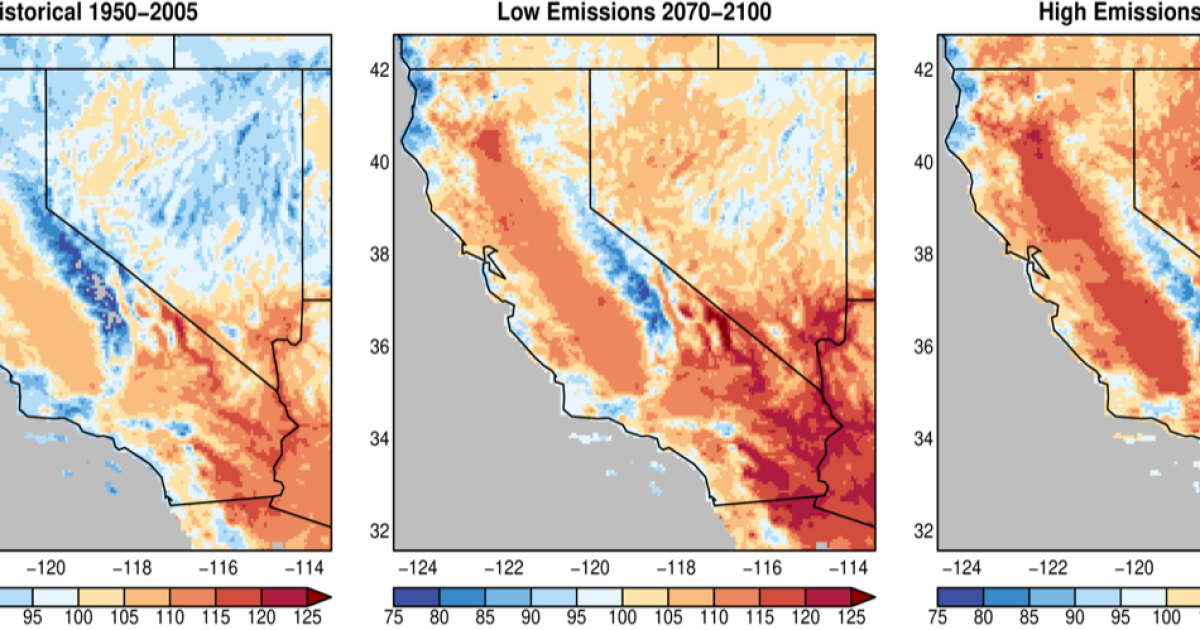They are urging the justices to intervene now and rule that climate change is a global phenomenon and a matter for federal law, not one suited to state-by-state claims.
“The stakes could not be higher,” companies said in an appeal that comes before the court on Thursday. “Over two dozen cases have been filed by various states and municipalities across the country seeking to impose untold damages on energy companies … and attempting to assert control over the nation’s energy policies …. This court should put a stop to it.”
The climate change lawsuits at issue are patterned after the successful mass lawsuits filed by states and others against the tobacco industry over cigarettes and the pharmaceutical industry over opioids.
Cigarettes and opioids were sold legally, but the suits alleged that industry officials conspired to deceive the public and hide the true dangers of their highly profitable products.
Last September, California Gov. Gavin Newsom and Atty. Gen. Rob Bonta sounded the same theme when they filed a lawsuit in San Francisco County Superior Court against five of the largest oil and gas companies — Exxon Mobil, Shell, Chevron, ConocoPhillips and BP — and the American Petroleum Institute for what they described as a “decades-long campaign of deception” that created climate-related harms in California.
“For more than 50 years, Big Oil has been lying to us — covering up the fact that they’ve long known how dangerous the fossil fuels they produce are for our planet,” Newsom said in announcing the suit.
Bonta said the oil and gas companies “have privately known the truth for decades — that the burning of fossil fuels leads to climate change — but have fed us lies and mistruths to further their record-breaking profits at the expense of our environment …. It is time they pay to abate the harm they have caused.”
Under state law, plaintiffs can seek damages for broad and open-ended claims like a failure to warn of a danger, false advertising or creating a public nuisance. All three claims are cited in California’s lawsuit. Federal law, by contrast, is usually limited to damage claims that arise from a federal law.
The city and state officials suing the energy industry are determined to keep the climate change cases in state courts, while industry lawyers have fought hard — but so far unsuccessfully — to move them to federal jurisdiction.
Over the last four years, the justices have turned away procedural appeals from the energy industry seeking to transfer these cases from state to federal courts.
This week, however, the industry’s lawyers are asking the justices to decide the underlying question that affects all of them: Does federal law and the Clean Air Act override or preempt states and their courts from punishing the oil industry for the harm caused by greenhouse gases?
“This is the end game for the oil companies,” said Pat Parenteau, an environmental law expert at the Vermont Law School. “They want to get this in front of the conservative Supreme Court. It’s an attempt to knock out all of these cases.”
Los Angeles lawyer Theodore J. Boutrous Jr., who represents Chevron, said the pending lawsuits are based on an “outlandish” legal theory rooted in false advertising claims, rather than on the underlying greenhouse gas emissions.
“It is extremely important for the Supreme Court to grant review now,” he said. “Global climate change requires a coordinated international policy response, not the unleashing of dozens of baseless local lawsuits that could wreak havoc on federal energy policy and go on for years, even if they are ultimately doomed to failure.”
If the court votes to hear the cases, Sunoco vs. City of Honolulu and Shell vs. Honolulu, it will be a victory for the energy industry and a sign that the justices are likely to block the climate change lawsuits. The justices would hear arguments in the fall.
If the appeals are turned down, however, even more cities and states will be encouraged to file claims of their own and seek billions in damages from the fossil fuel industries.
The case under appeal began four years ago when the city and county of Honolulu sued Sunoco and 14 other major oil and gas producers alleging a failure to warn and creating a nuisance.
The Hawaii Supreme Court last year refused to dismiss the case.
“Simply put, the plaintiffs say the issue is whether defendants misled the public about fossil fuels’ dangers and environmental impact. We agree …. This suit does not seek to regulate emissions and does not seek damages for interstate emissions,” the state court said in a unanimous opinion. “Rather, plaintiffs’ complaint clearly seeks to challenge the promotion and sale of fossil-fuel products without warning and abetted by a sophisticated disinformation campaign.”
The issue has divided the red and blue states.
At an early of stage of the Sunoco case, California joined with 12 other Democratic-leaning states in urging the U.S. 9th Circuit Court of Appeals to keep the suit in Hawaii state court. They argued the case was about protecting consumers from “deceptive conduct,” which is “an area traditionally regulated by the states.”
When the case reached the U.S. Supreme Court, Alabama and 19 other Republican-led states filed a friend-of-the court brief on the side of the oil companies.
They argued that Hawaii and its courts do not have “power to enact disastrous global energy policies via state tort law … and imperil access to affordable energy.”
Separately, Alabama filed an unusual motion in May asking the Supreme Court to allow an “original” claim to raise the same issue. Typically, original claims arise from state disputes over boundaries or river water. Legal experts doubted the court would grant such a claim.
Lawyers for Honolulu urged the court to stand aside for now and wait, likely for several years, until there is a final verdict in its lawsuit.
The justices could announce by mid-June whether they will take up the climate change cases.
